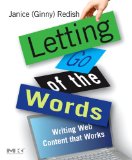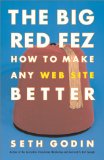
“Writing web content that works” is the subtitle of this book, and it delivers a thorough treatment of the topic. I don’t think it contains any radical new ideas, but it is a nicely organised compilation of what some people call “best practices” about writing and layout for the web.
Of course, you can’t possibly summarise an entire book with a list of bullet points, but here are the ideas in the book that struck me as being especially useful. Continue reading “Letting Go of the Words — Ginny Redish” →


